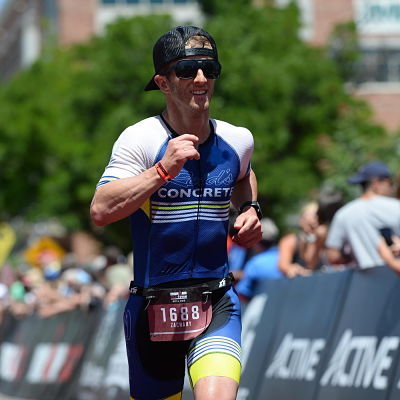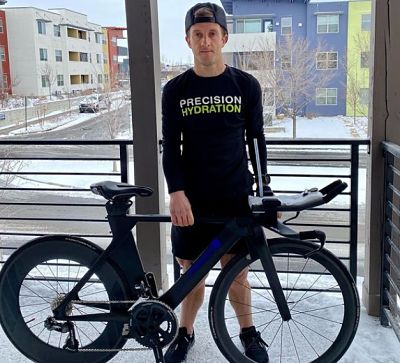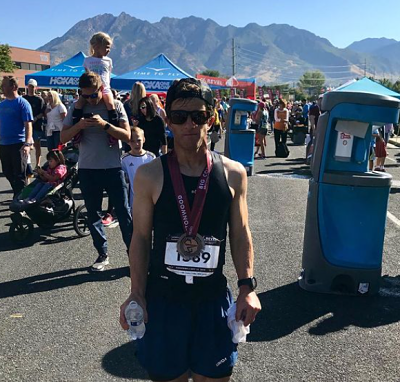Age-group triathlete Zachary Josie was born with Ellis-van Creveld syndrome - a type of dwarfism that's characterized by short limbs and an abnormal development of bones.
We caught up with Zach to find out how the improvements he's made to his equipment, technique and training structure has led to him earning the moniker of 'Fastest Dwarf On Earth'...
Hey Zach, great to catch up with you. Firstly, how did the 'Fastest Dwarf on Earth' title come about?
The incident when I was first called "The Fastest Dwarf On Earth" (a nicer version of what he actually said) by a guy at a half marathon, to me, made for a funny story. I was able to shrug it off because I understood that he was actually impressed and meant no harm.
I think it’s important to note that I take on that moniker because I understand the importance of being able to laugh at myself and accept the hand I was dealt.
I struggled with my body in my younger years, but once I was able to get over myself and realize that things could always be worse, I started to thrive. The #FastestDwarfOnEarth is my way of making light of the not very positive hashtags floating around triathlon on social media.

I was listening to your interview on the TrainerRoad podcast and I understand you were very good at sport as a kid, so how did that progress into taking up triathlon?
I’ve always been pretty competitive and played basketball and baseball throughout school. Around 9th grade I stopped growing, but nobody else did.
It was the first time I realized that I would have to find ways to work around my syndrome and it was the beginning of the end to competitive team sports for me.
At that time, Lance Armstrong was a household name and I took to riding a stationary bike my parents had at the house (I naively equated a home gym bike ride to competing in the Tour De France).
Surprisingly, I discovered I had a relatively big engine. Eventually that lead to spin classes, some light running a couple times a week, and with a nudge or two from my older brother, I discovered that challenging myself to go further and faster was very rewarding and fed my competitive side.
When a family friend started telling me about these triathlons he was doing, I got curious and eventually decided to sign up.
You mentioned that you realised that you'd have to work around EVC when competing in sport, so how have you adapted to make yourself competitive as a triathlete?
One thing I take pride in is my resilience, which is definitely a direct effect of knowing I’m not built quite like other people. That said, I would say that I'm most affected by the industry standards for equipment.
If something fits my legs it’s too short for my torso, or it's too long for my legs if the torso fit is good. Especially with wetsuits. I've tried 4 different wetsuit brands and am still not 100% comfortable in one.
I ended up getting a custom tri kit made by a local Utah company called Hyperthreads. They let me try on every size and suit they thought might work and gave excellent advice along the way.
Swimming is an interesting challenge, my arms are as disproportionate to my body as my legs. So, it’s like having a banana for a torso trying to pull yourself through the water with baby carrots for arms and legs.
Swimming took a long time and is still a work in progress. My swim coach really stressed the importance of rotating my hips appropriately. It was almost 4 entire months of hip rotation drills and learning how to breathe. I’m just now learning how to build arm strength and incorporate a better, more efficient stroke.
And I imagine when it comes to equipment, finding a proper bike fit can be a challenge?
Bikes that work for me are extremely hard to come by. Even bikes marketed for smaller women don’t always work.
I have spent many hours with my bike fitter John Higgins, trying to get in a position to be aggressive but also be able to last. It started by finding the smallest frame I could (2014 Cervelo P5 45cm) and getting comfortable from the waist down, swapping my cranks for 145mm cranks and taking out as many spacers as we could.

Now my issue has been getting long enough. After many discussions with Dan Kennison of Premier Bikes (basically me bugging him with a million questions a week), he was able to get one of his bikes to match the frame size and stack to my P5, but was able to extend the reach enough to really make it comfortable.
Another affect from EVC is the way my feet are shaped. The bones spread wide right before the toes making it hard to find comfortable running shoes.
Not knowing any of these setbacks before I started racing probably ended being a good thing. I'm sure I would have been discouraged right out of the gate and possibly never even started racing.
And when it comes to the structure of your training, how do you fit that around your 3am alarm call for your daily shift with your Dad's residential concrete company?
When I decided to take on structured training for longer distance triathlons, I had originally stuck to the after work schedule but very soon realized there were too many sessions to fit in after work and still have a life with my wife. I started out doing easier stuff in the morning and the harder stuff after work.
It turned out I was not nailing the harder sessions very well because I would carry too much fatigue into them, so I swapped the harder sessions for the morning.
Despite my alarm going off at 3am, I can cut myself a little slack if I really nail those early workouts, so I could then turn a night swim into a technique-focused swim or even a stretching session if I've had a hard work day.
So what does a typical week of training look like for you at the moment?
I train 10-12 hours weekly most of the time, but occasionally get up to almost 15 hours or down to 8 hours. An average week looks something like this:
| Day | Morning | Afternoon |
|---|---|---|
| Monday | 60 - 90 mins bike | Swim |
| Tuesday | Run (usually track and speed work) | - |
| Wednesday | 60 - 90 mins bike (sometimes with a brick run) | Swim |
| Thursday | Run (usually hills) | - |
| Friday | 2-6 hours bike (often with a brick run) | Swim |
| Saturday | Long run (90 mins - 2 hours) + easy spin | - |
| Sunday | Recovery day |
Every 4th week is a recovery week of sorts.
How do those early starts impact your approach to recovery?
The first thing I implemented is taking Sunday almost completely off of anything structured.
The past year I have really focused on getting to bed by 8pm, trying for at least 7 hours of sleep on weeknights and letting myself naturally wake up on weekends.
I also try to take a 20-30 minute nap on my 1-hour lunch break, which has really helped my mood and recovery.

You can't go wrong with an afternoon nap! How has having a more structured approach to recovery and training impacted your results since you first started out in triathlon?
My first triathlon was the Spudman - an Olympic-distance race in Burley, Idaho, in the summer of 2015. The family friend who got me into triathlon convinced me that my concerns of the swim would be taken care of by the river-aided swim. I quite literally got on my back and let the current take me.
I then threw on gym shorts and a pocket tee shirt and got ready to bike. I had basically only been on spin and stationary bikes so I borrowed my uncle's 56cm frame road bike (a million sizes too big) with the seat smashed down and completely tilted so I could reach the pedals.
I finished in 2 hours, 45 minutes and after that I was hooked. I got a bike a little closer to my size and did two more races that year.
The next two years I did those same three races and while I trained a little better, I still had very little structure. After the 2017 Spudman I was so disappointed with my run, I told my wife I wasn’t going to race anymore.
But by the end of the 3-hour ride home, not only had she talked me back into racing, she convinced me to sign up for swim lessons, find someone who could get me a better training plan (which is what lead me to TrainerRoad), get an even more reliable bike, and sign up for the 2018 IM 70.3 St George, where I went 6:05:58.
That same year I shaved roughly 20 minutes off that time in Indian Wells and then another 10ish minutes in the 2019 IM 70.3 Oceanside.
By the end of 2019, I had confidence that I could go under 5:10. Had it not been for a bike crash at IM 70.3 Tempe, I might have done it. Despite having crashed with 18 bike miles left and not being able to properly use the right side of my body to run, I managed another PR of 5:29:11.
The biggest thing I learned is definitely how to structure my training and how to change workouts to better suit my specific needs. I learned to understand that what I need to do to stay fit and healthy will always look very different from anyone else’s training plan.
So looking forward, what are your goals in triathlon for the coming months and years?
My big goal now is to go sub-5 in a 70.3 race and finish a full distance race, with this year's IM Canada my target.
Eventually, I’d like to go under 11 hours in a full distance race. I believe I can achieve both of those goals and maybe light a fire for someone else who might be like me.